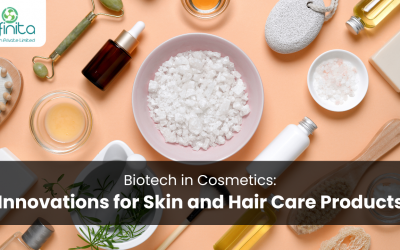
The Ultimate Guide to Enzymes in Skincare
Enzymes in skincare are increasingly becoming popular. Many skin exfoliating products, peels, creams, and several others contain enzymes. These improve the appearance and structure of the skin. Our skin sheds dead cells and regrows new cells which are made of a protein called ‘Keratin.’ These dead cells left on the upper layer of skin are called the epidermis, giving the appearance of dull skin. Enzymes work by breaking down the keratin and removing dead skin cells from the skin. This process clears the clogged pores and congestion leading to skin becoming radiant, smooth, and clean.
Enzymes Role in Human Body
Enzymes are biocatalysts that alter the rate of chemical reactions. The human body produces different enzymes for survival. These enzymes work by increasing the rate of reactions in our body cells. Without enzymes, these reactions would not have been possible due to the temperature and pH levels of the body cells. Enzymes in skincare products help pass the nutrients deep into the epidermis by breaking them into peptides and essential amino acids. Some enzymes facilitate collagen production which helps in maintaining the plumpness of the skin while others help by repairing the ultraviolet and free radical damage done to the skin.
Which Enzymes are Used in Skin Care?
Proteolytic and Protease enzymes are often used in the skincare industry. Enzymes in skincare work by removing the dead skin cells from the epidermis, the uppermost layer of the skin. These enzymes break down the protein bonds between dead skin cells and the epidermis. The dead skin cells are thus removed and healthy skin surfaces. The unclogged pores result in skin free of blackheads, roughness, and blemishes. These enzymes also increase skin elasticity and plumpness by maintaining natural moisture in the skin. Skin products containing fruit enzymes are gentler on the skin than chemicals as they are naturally derived.
Different Ways Enzymes Work on Skin Issues
Here are some of the ways enzymes are beneficial for skin health.
a. Clear Breakouts and Clogged Pores
The natural flow of sweat and skin oils gets disrupted due to clogged pores. The disrupted pores due to trapped oil and bacteria buildup lead to frequent breakouts in the skin. Skin pores also become enlarged due to this. Enzymes clear pores of dead skin and allow for an improved flow of sweat and natural oils leading to better skin and a reduction in pore size.
b. Smoothing Uneven Skin
Enzymes in skincare industry exfoliate the skin gently. Regular exfoliation results in sloughing off dead skin resulting in smooth healthy skin and a consistent rate of cell turnover.
c. Deals with Skin Oiliness and Dryness Issues
Enzymes are gentler and more efficient than chemicals in skincare products. These work by repairing the skin, maintaining moisture levels, and creating a protective barrier against irritants and bacteria. All this results in balanced skin free from dryness and oversecretion of oils.
Some Fruit Enzymes Used in Skin Products
Given below is a list of fruit enzymes beneficial for skin health.
a. Pineapple Fruit Enzymes
Pineapple contains bromelain enzyme which breaks down dry and dead skin cells ultimately leading to softer and smoother skin. Bromelain enzyme in skin care treatments acts like alpha hydroxy acid and removes dead skin cells. This enzyme also has anti-inflammatory properties on the skin.
b. Papaya Fruit Enzymes
Papaya fruit contains the papain enzyme. The papain enzyme in skin care works by increasing the elasticity of the skin thus preventing wrinkles. It also dissolves and removes dead skin cells and brightens the skin naturally.
c. Banana Fruit Enzymes
Bananas contain amylase and maltase enzymes. These enzymes soften and nourish the skin.
Skin Friendly Dietary Enzymes
The human body requires several nutrients like vitamins, amino acids, and essential fats and minerals to function adequately. These macro and micronutrients are derived from the food we eat. Digestive enzymes produced by our body break down food particles in the gut, thus helping the digestion and absorption of vital nutrients in the body. Improper digestion can result in several ailments and problems and can also potentially lead to acne and eczema. Certain enzymes found in fruits like papain and bromelain enzymes stimulate digestion. You can increase their uptake by consuming them naturally or in edible over-the-counter products containing them.
Production of Enzymes in Skin Care
Skincare products frequently use fruit enzymes from pineapple, papaya, and pumpkin. These enzymes are extracted through a fermentation process which is similar to winemaking. After fermentation, these enzymes are included in skincare products after trials and proper quality checks.
Conclusion
Enzymes are being used in several other topical products as well. Enzymes like Coenzyme Q10, Superoxide Dismutase, and DGAT-1 (diacylglycerol acyltransferase) are also used in cosmetics and skincare products. These are used for hair renewal, preventing acne, repairing damaged skin, and even skin cancer treatments. The share of enzymes in skincare products is predicted to grow exponentially in the future.
BROMELAIN
Our Bromelain Enzyme is a type of protease derived from Pineapple stem.

Smooth skin

Depigmentation

Tightens skin
Related Articles
Unlocking the Secrets: The Role of Cosmetic Enzymes in Skincare
In recent years, the beauty industry has been abuzz with talk of cosmetic enzymes and their incredible benefits for the skin. Many skincare enthusiasts are curious about what these enzymes are, how they work, and how they can be incorporated into their daily skincare...
Biotech in Cosmetics: Innovations for Skin and Hair Care Products
Introduction to Biotech in Cosmetics The beauty industry is witnessing a revolutionary shift with the integration of biotechnology. This fusion is not just a trend but a transformative movement, reshaping how we perceive and use cosmetics. Biotech in cosmetics...

The Ultimate Guide to Enzymes in Skincare
Enzymes Role in Human Body
Enzymes are biocatalysts that alter the rate of chemical reactions. The human body produces different enzymes for survival. These enzymes work by increasing the rate of reactions in our body cells. Without enzymes, these reactions would not have been possible due to the temperature and pH levels of the body cells. Enzymes in skincare products help pass the nutrients deep into the epidermis by breaking them into peptides and essential amino acids. Some enzymes facilitate collagen production which helps in maintaining the plumpness of the skin while others help by repairing the ultraviolet and free radical damage done to the skin.
Which Enzymes are Used in Skin Care?
Proteolytic and Protease enzymes are often used in the skincare industry. Enzymes in skincare work by removing the dead skin cells from the epidermis, the uppermost layer of the skin. These enzymes break down the protein bonds between dead skin cells and the epidermis. The dead skin cells are thus removed and healthy skin surfaces. The unclogged pores result in skin free of blackheads, roughness, and blemishes. These enzymes also increase skin elasticity and plumpness by maintaining natural moisture in the skin. Skin products containing fruit enzymes are gentler on the skin than chemicals as they are naturally derived.
Different Ways Enzymes Work on Skin Issues
Here are some of the ways enzymes are beneficial for skin health.
a. Clear Breakouts and Clogged Pores
The natural flow of sweat and skin oils gets disrupted due to clogged pores. The disrupted pores due to trapped oil and bacteria buildup lead to frequent breakouts in the skin. Skin pores also become enlarged due to this. Enzymes clear pores of dead skin and allow for an improved flow of sweat and natural oils leading to better skin and a reduction in pore size.
b. Smoothing Uneven Skin
Enzymes in skincare industry exfoliate the skin gently. Regular exfoliation results in sloughing off dead skin resulting in smooth healthy skin and a consistent rate of cell turnover.
c. Deals with Skin Oiliness and Dryness Issues
Enzymes are gentler and more efficient than chemicals in skincare products. These work by repairing the skin, maintaining moisture levels, and creating a protective barrier against irritants and bacteria. All this results in balanced skin free from dryness and oversecretion of oils.
Some Fruit Enzymes Used in Skin Products
Given below is a list of fruit enzymes beneficial for skin health.
a. Pineapple Fruit Enzymes
Pineapple contains bromelain enzyme which breaks down dry and dead skin cells ultimately leading to softer and smoother skin. Bromelain enzyme in skin care treatments acts like alpha hydroxy acid and removes dead skin cells. This enzyme also has anti-inflammatory properties on the skin.
b. Papaya Fruit Enzymes
Papaya fruit contains the papain enzyme. The papain enzyme in skin care works by increasing the elasticity of the skin thus preventing wrinkles. It also dissolves and removes dead skin cells and brightens the skin naturally.
c. Banana Fruit Enzymes
Bananas contain amylase and maltase enzymes. These enzymes soften and nourish the skin.
Skin Friendly Dietary Enzymes
The human body requires several nutrients like vitamins, amino acids, and essential fats and minerals to function adequately. These macro and micronutrients are derived from the food we eat. Digestive enzymes produced by our body break down food particles in the gut, thus helping the digestion and absorption of vital nutrients in the body. Improper digestion can result in several ailments and problems and can also potentially lead to acne and eczema. Certain enzymes found in fruits like papain and bromelain enzymes stimulate digestion. You can increase their uptake by consuming them naturally or in edible over-the-counter products containing them.
Production of Enzymes in Skin Care
Skincare products frequently use fruit enzymes from pineapple, papaya, and pumpkin. These enzymes are extracted through a fermentation process which is similar to winemaking. After fermentation, these enzymes are included in skincare products after trials and proper quality checks.
Conclusion
Enzymes are being used in several other topical products as well. Enzymes like Coenzyme Q10, Superoxide Dismutase, and DGAT-1 (diacylglycerol acyltransferase) are also used in cosmetics and skincare products. These are used for hair renewal, preventing acne, repairing damaged skin, and even skin cancer treatments. The share of enzymes in skincare products is predicted to grow exponentially in the future.
0 Comments
Submit a Comment
You must be logged in to post a comment.
BROMELAIN
Our Bromelain Enzyme is a type of protease derived from Pineapple stem.

Smooth skin

Depigmentation

Tightens skin
Unlocking the Secrets: The Role of Cosmetic Enzymes in Skincare
In recent years, the beauty industry has been abuzz with talk of cosmetic enzymes and their incredible benefits for the skin. Many skincare enthusiasts are curious about what these enzymes are, how they work, and how they can be incorporated into their daily skincare...
Biotech in Cosmetics: Innovations for Skin and Hair Care Products
Introduction to Biotech in Cosmetics The beauty industry is witnessing a revolutionary shift with the integration of biotechnology. This fusion is not just a trend but a transformative movement, reshaping how we perceive and use cosmetics. Biotech in cosmetics...
The Role of Enzymes in Natural Skin Renewal
The Skin- Our body's largest organ and frontline defender against external assaults. Just like the changing seasons or chapters in a book, our skin undergoes cycles of renewal and regeneration. And guess what plays a starring role in this process? You guessed it -...




0 Comments